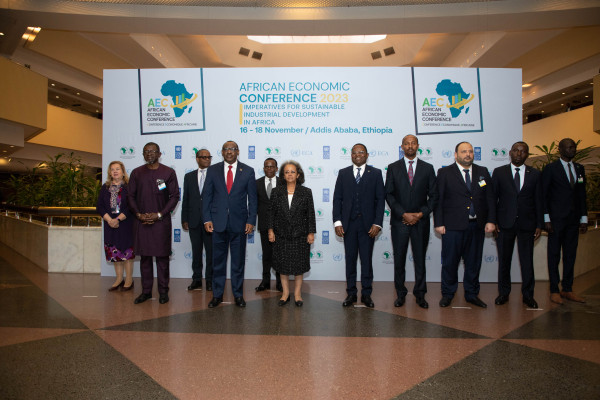African countries need to show stronger political will to advance industrialisation, including the adoption of new policies to promote improved productivity and harness the potential of a growing youth population, delegates attending the 2023 African Economic Conference heard.
The three-day conference opened in the Ethiopian capital, Addis Ababa, on Wednesday under the theme “Imperatives for Sustainable Industrial Development in Africa”.
Organised by the African Development Bank, the United Nations Economic Commission for Africa and the United Nations Development Programme, this year’s conference, the 18th edition, brought together experts, the private sector, researchers, and young people to discuss the challenges and prospects of industrialisation in Africa.
In a welcome address, Ethiopian President Sahle-Work Zewde underscored the importance of industrialisation as an essential driver of inclusive economic growth.
“The need to change the narrative of Africa’s industrialisation for inclusive and sustainable industrial development has become more imperative; African countries need to build a robust industrial sector that can withstand external shocks,” she told participants.
President Sahle-Work stressed that industrial policies should focus on supporting domestic industrial development and promoting improved productivity and competitiveness, underscoring that COVID-19 had taught hard lessons about the vulnerability of global production and value chains to various shocks.
Africa is home to some of the world’s fastest-growing economies with an attractive human capital base, dominated by a young population base compared to the aging populations of other regions, and is therefore seen as the future frontier labour market. Despite this, the pace of industrialisation and economic transformation in Africa remains slow compared to other regions.
United Nations Under-Secretary-General and Executive Secretary of the Economic Commission for Africa (ECA), Claver Gatete, called on the conference to explore the policies and institutional capacities needed for sustainable industrialisation, inclusive development, and structural transformation. “This will help us rebuild and emerge stronger from the crises,” he said, adding that implementing the African Continental Free Trade Area (AfCFTA) agreement is also crucial.
Gatete affirmed the ECA’s commitment to supporting countries and regional economic communities to develop national and regional implementation strategies to help them integrate the AfCFTA agreement into their national priorities and identify areas of competitive advantage.
In a presentation, African Development Bank’s Chief Economist and Vice President Kevin Urama urged African countries to think differently and implement transformative policies that accelerate indigenous manufacturing capacity and encourage consumption of locally made products.
“Africans need to think African, produce African, and consume African to encourage indigenous industrial development in Africa,” he said.
Urama proposed several approaches to accelerate industrialisation and structural transformation in Africa. These include implementing a strategic industrial policy that encourages local production and consumption, as well as domestic and regional value chain development.
“Policies such as local content and franchising could deliver low-hanging fruits,” Urama said. He added that Africa also has the natural resources needed to lead the electric vehicle technology revolution.
He highlighted the African Development Bank Group’s role, in collaboration with partners, in supporting Africa’s industrialisation and economic transformation process through its High 5 priority Industrialise Africa (https://apo-opa.co/46kekZt).
Director of the Regional Service Centre at the United Nations Development Programme’s Regional Office for Africa, Matthias Naab, urged the promotion of mutually beneficial public-private partnerships committed to manufacturing in Africa.
He also welcomed the growing recognition of youth in development policies. “The inclusion of young African researchers in this conference is a testament to our commitment to harnessing their intellectual power; youth are the industrialists of today and tomorrow, and we want to ensure that they lead in identifying pathways forward,” he said.
In a virtual address, Ms Fatou Haidara, Deputy Director-General of the United Nations Industrial Development Organization (UNIDO), cited Africa’s young population, vibrant small and medium enterprises, renewable energy potential and abundant natural resources as the potential for the continent’s success.
“Local manufacturing capacity, inclusive access to global financial markets, sustainable value chains and climate action are necessary prerequisites for a prosperous Africa,” Haidara said, underlining UNIDO’s commitment to support countries to develop capacity, analysis, and evidence-based policy advice.
Distributed by APO Group on behalf of African Development Bank Group (AfDB).
Click here (https://apo-opa.co/47DPLrx) for photos.
Media contacts:
Sophia Denekew
Media Relations
ECA
denekews.uneca@un.org
Eve Sabbagh
Strategic Communication Specialist
UNDP
eve.sabbagh@undp.org
Emeka Anuforo
Communication and External Relations
African Development Bank
media@afdb.org

